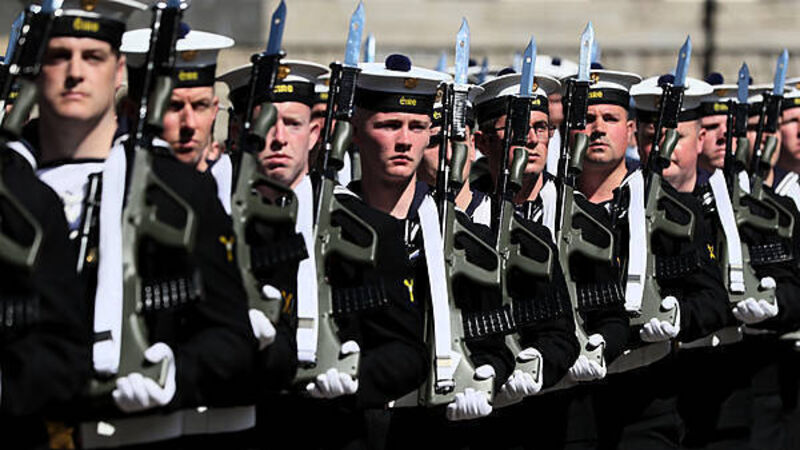Tax credit for Naval Service fails to improve staff retention, report finds

Seán McCárthaigh
There is no evidence that a tax credit introduced to encourage members of the Naval Service to stay enlisted has improved staff retention or increased the number of patrols by naval vessels, according to a new report.
The study also claims that the eligibility criteria for the tax credit are “too inaccessible” for a majority of sailors and are more likely to negatively impact female staff.
The findings of research carried by the Parliamentary Budget Office has questioned the effectiveness of the Sea Going Naval Personnel Tax Credit introduced in 2020 as a “once-off” measure to improve pay of members of the Naval Service which was also designed to provide a financial incentive for sailors to undertake naval patrols.
However, the report by the PBO, which is part of the Houses of the Oireachtas, noted the number of sailors in the Naval Service has fallen from 902 at the time the tax credit was introduced to 703 by 2025.
The number of personnel undertaking naval patrols decreased from 572 to 404 over the same period.
The report said the financial benefit of the tax credit, which had increased from €1,270 in 2020 to €1,500 in 2021, had rapidly been eroded by high inflation levels over recent years.
The PBO estimated that the tax credit would need to increase to €1,825 annually to compensate for inflation since 2020 just to have a “stand still” impact.
It also claimed that the existing eligibility criteria for the tax credit were “too inaccessible” for most members of the Naval Service, while the strict conditions were also more likely to negatively impact on female staff.
The PBO said the tax credit rules require sailors to complete 80 patrol days annually to be eligible.
However, it estimated that sailors only complete an average of 55 days at sea per annum.
The PBO pointed out that female members of the Naval Service were less likely to complete 80 days at sea due to pregnancy and maternity leave which meant the tax credit was not gender balanced.
Overall, it calculated that just 29 per cent of staff in the Naval Service can avail of the tax credit, even though 63 per cent undertake sea patrols.
The report is published at a time that the Naval Service is significantly under strength and experiencing ongoing issues in relation to staff retention.
As part of the research, the PBO has recommended that the tax credit be abolished, despite the decision of the Government to extend it to 2029, as it claimed that it is “unclear that the tax credit is fit for purpose.”
The PBO argues that pay and incentive issues should not be addressed through the tax system.
The report said the tax credit had failed to achieve its stated policy objectives and it recommended that further increases to the Patrol Duty Allowance – a daily rate paid to sailors at sea – should be considered instead as it contributes towards take home pay and pension benefits.
The Department of Finance has estimated that the annual cost of the tax credit is €0.5 million. However, the PBO said the most recent data available suggests the average cost is €0.33 million.
In response, the Department of Defence said it did not agree with the conclusion of the PBO report that the Naval Personnel Tax Credit should be abolished.
"The tax credit is an important incentive which, taken together with a number of other elements, form a suite of measures that have contributed successfully to encourage sea-going activity by our Naval personnel," a spokesman for the department said.
"Permanent measures have been introduced to compliment this tax credit, which has been in place since 2020 and which will now continue to 2029. Patrol Duty Allowance, which is linked to pay increases, has been doubled with effect from 1 January 2024. The Patrol Duty Allowance is pensionable for those who joined post-2004.
"In addition the PBO are unsure about whether permanent measures are being developed or are progressing (ref Page 5) – again the Department could have informed the Report about the additional permanent measures which have been introduced. As well as the doubling of Patrol Duty Allowances since 1 January 2024, access to private health care for all personnel which has been introduced September 2023 and the starting salary for new recruits on completion of training begins at €41,465.
"To illustrate the impact of the measures a Seaman (Private 3* equivalent) in their first year of service can now earn over €51,700 if they spend 80 days at sea, while also benefiting from a Tax Credit of €1,500.
"The measures introduced in 2024 have positively impacted the number of patrol days undertaken in 2024 with an almost 5% increase in the number of patrol days undertaken."









